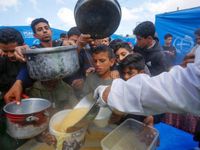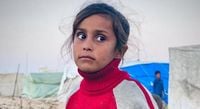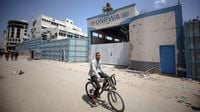On Friday, May 9, 2025, humanitarian agencies voiced strong opposition to Israel's proposed plan to control relief assistance in Gaza, warning that it would endanger civilian lives and lead to mass displacement. The United Nations Children’s Fund (UNICEF) spokesperson James Elder emphasized that the Israeli proposal, which aims to establish aid hubs exclusively in southern Gaza, would force civilians into making an "impossible choice between displacement and death." Elder stated, "It’s dangerous to ask civilians to go into militarized zones to collect rations… humanitarian aid should never be used as a bargaining chip." This stark warning comes as the Gaza Strip has been under a complete aid blockade for over two months, with critical supplies of food, water, medicine, and fuel dwindling dangerously low.
The Israeli aid distribution plan envisions a mere 60 aid trucks entering Gaza each day, which is just one-tenth of the volume delivered during the ceasefire that lasted from January 19 to March 18, 2025. Elder insisted, "There is a simple alternative: lift the blockade, let humanitarian aid in, save lives." The United Nations Relief and Works Agency (UNRWA) reported that over 3,000 trucks of aid are currently stuck outside Gaza, with urgent calls for the blockade to be lifted so that assistance can reach those in dire need.
UNRWA's Director of Communications, Juliette Touma, lamented the waste of resources, stating, "The clock is ticking. The gates must reopen, the siege must be lifted as soon as possible." Inside Gaza, the situation has become increasingly dire, with reports indicating that over 80 community kitchens have shut down since late April due to a lack of supplies, exacerbating widespread hunger.
In stark contrast to the UN's humanitarian approach, the United States has announced the establishment of a new foundation, the Gaza Humanitarian Foundation (GHF), to coordinate aid deliveries. US Ambassador to Israel Mike Huckabee confirmed that Israel would not participate in the distribution of aid but would provide security for operations. This initiative, announced by State Department spokeswoman Tammy Bruce, aims to prevent aid from being diverted by Hamas and other groups. However, it has drawn sharp criticism from humanitarian organizations, who view it as an attempt to undermine existing aid structures.
Chris Gunness, a former UNRWA spokesperson, condemned the GHF's initiative, calling it "aid-washing" and accusing Israel and its allies of using humanitarian aid to mask the ongoing humanitarian crisis in Gaza. Gunness asserted, "They’re being starved as a part of the mass and illegal forced displacement, which is very much part of Israel’s genocidal ambitions against the Palestinians." The proposal is seen as an attempt to dismantle UNRWA, which has the infrastructure necessary to prevent mass starvation in Gaza.
As the humanitarian crisis deepens, the US plan appears to mirror an Israeli scheme approved by its security cabinet, which calls for the construction of four secure distribution sites intended to serve up to 1.2 million people. However, this plan has been met with significant backlash, as it requires Palestinians displaced from northern Gaza to relocate to access aid. Huckabee insisted that the most significant danger is inaction, stating, "People dying from hunger" is a critical concern.
The US's push to implement this new aid distribution system comes amid reports of famine-like conditions in Gaza, where the blockade has left 2.3 million residents without access to essential supplies. At least 57 Palestinians have reportedly starved to death, with the majority being children, the sick, and the elderly. The humanitarian agency OCHA has reported that a third of community kitchens in Gaza have been forced to shut down due to food and fuel shortages, drastically reducing the availability of meals.
UN agencies have reiterated their refusal to cooperate with the GHF plan, citing concerns that it "weaponizes" aid. Jens Laerke, spokesperson for OCHA, stated, "There is no reason to put in place a system that is at odds with the DNA of any principled humanitarian organization." The UN has emphasized that humanitarian aid should be based solely on need, not used as a tool for political leverage.
In a related development, reports indicate that the Trump administration has threatened UN agencies with funding cuts if they do not support the new US-led aid initiative. Steve Witkoff, the US special envoy for the Middle East, issued warnings during a private briefing to UN Security Council ambassadors, indicating that the US might sever funding to the World Food Programme (WFP), which constitutes approximately 40% of its budget. This pressure has raised concerns among humanitarian officials about the implications for global aid efforts.
As the Gaza war continues, triggered by the Hamas-led attacks on southern Israel on October 7, 2023, the humanitarian situation remains critical. The Israeli military campaign has reportedly resulted in the deaths of over 52,700 people in Gaza, predominantly women, children, and the elderly. The recent Israeli security cabinet decision to intensify military operations against Hamas has drawn widespread international condemnation, with calls for the unhindered passage of humanitarian aid.
UK Minister for the Middle East, Hamish Falconer, expressed grave concerns about the potential consequences of the new Israeli plan, stating, "It is hard to see how, if implemented, the new Israeli plan to deliver aid through private companies would be consistent with humanitarian principles and meet the scale of the need." He urged for urgent clarity from the Israeli government regarding their intentions, emphasizing that humanitarian principles should be applied consistently in all conflict zones.
As the situation evolves, aid officials have conducted careful analyses and concluded that they cannot participate in the US-Israeli scheme. James Elder from UNICEF warned that the proposed plan would lead to more suffering for children, as civilians would be forced to travel to militarized zones to receive aid. The UN reports that 90% of Gaza’s population has already been displaced during the ongoing conflict, and the risk of famine continues to grow without a resolution to the blockade.
In summary, the humanitarian crisis in Gaza is escalating, with conflicting approaches to aid distribution creating significant challenges for those in need. The international community watches closely as the situation develops, hoping for a resolution that prioritizes the safety and well-being of the people of Gaza.






